- Home
- Linwood Barclay
Chase Page 2
Chase Read online
Page 2
“You know how I can tell it’s not clean?” she said. “When I run some water into the shower, like this.” And she turned on the cold, pulling her hand back quickly so as not to get herself wet. “You see what the water does when it hits the tiles? It just kind of spreads out. But if that wall were clean and shiny, the water would bead up into drops. Do you see any drops?”
“I see some,” Jeff said tiredly. He’d been awake since six o’clock, before the sun was even up. That struck him as awfully early for a twelve-year-old kid to have to face the world. Especially in the late summer, when there was no school. It would resume in a couple of weeks, and this was the first time Jeff could ever remember looking forward to going back.
Today was a Saturday, which, at one time, was a day when Jeff got to sleep in, and even when he did finally get up, goof off. But it had been a long time since he’d had that kind of Saturday. It was only ten in the morning, but Jeff felt as though he’d been up for days.
Saturday was the busiest day around here at Flo’s Cabins. Most people who came to his aunt’s fishing camp here on Pickerel Lake, at least in the summer months, stayed for a week at a time, and that week ran from Saturday to Saturday. So on those days, many or all of the eight cabins would be vacated, and new guests would check in. Turnover Day, Aunt Flo called it.
One of Jeff’s many jobs on any given Saturday in the summer was to get those cabins cleaned as quickly as possible. Calling them cabins made them sound pretty rustic. And while they were not exactly palaces, each cabin had running water and a proper bathroom with a shower. Of all the jobs Jeff had to do, cleaning the cabins was the one he hated most. You get a bunch of fishermen renting a cabin for a week, and it can be a pretty frightening sight by the time they leave. Scum-caked dishes, half-empty beer bottles with cigarette butts in them, fish guts in the trash can. An amended line from a musical his mom liked ran through his head: These are a few of my least favourite things!
But Jeff would rather vacuum a hundred carpets, wash a thousand windows, clean a million stoves, before having to clean one bathroom used by three middle-aged fishermen for an entire week. That was major GBI: Gross Beyond Imagining. Did none of these guys know how to aim? Did they actually wash their hands before using the hand towels? Did they even take their muddy boots off before stepping into the shower?
Aunt Flo was a neat freak, so no matter how good a job you did, she’d find fault with it. Like she was doing on this particular Saturday morning, looking into the shower stall of Cabin Four, which was the last cabin Jeff would have to clean today. At least he wouldn’t have to clean Cabin Eight, where there would be no turnover. It had been rented for the entire summer by old Mr. Green. He pretty much looked after the place himself.
The only good news was, even though Jeff had several cabins to clean, there were no new guests arriving today, unless someone without a reservation drove in off the main road. That was always a possibility. But it was nearly the end of summer, Aunt Flo explained, and that meant families were getting ready to go back to work and preparing their kids for a return to school.
“I don’t think fishermen really care if all the tiles glisten that much,” Jeff said to Aunt Flo as he continued to struggle with the shower. “As long as it’s pretty clean, I think they’re okay with it.”
His aunt sighed. It was her favourite sound to make. She’d quickly breathe in, then let the air out long and low, shaking her head at the same time.
“That’s your whole thing, isn’t it?” she said. “All it has to be is good enough. Well, good enough is not good enough for me. I want things perfect.”
One might have thought, listening to her, that she was running a Hilton hotel instead of a fishing camp.
“Many of these men,” she continued, “may not care if everything sparkles, but quite a few bring their wives and the rest of their families, and we don’t want any of them to think that a cabin rented to them by Florence Beaumont is anything less than pure perfection.”
“Fine,” Jeff said, getting out his sponge and bottle of green cleaning spray and taking another run at it.
Aunt Flo, satisfied that she had defeated her nephew, went off to inspect his work in Cabin One. As the boy scrubbed, the cleanser fumes started getting into his lungs in the confined space of the shower and he thought maybe he’d pass out. Which, he thought, might not be the worst thing in the world. It would be like a mini-vacation.
At least once he was done here, he’d be outdoors. There were plenty of other chores that would get him out into the fresh air.
Aunt Flo had half a dozen fourteen-foot aluminum boats she rented out, which were tied up at one of several old, wooden docks. Jeff had to make sure they were cleaned and respectable. After finishing with the shower, he walked down to the water’s edge, a short distance from the cabins, waving some mosquitoes away from his face along the way.
The first boat he looked at made him think someone had been killed in it. The bottom appeared to be filled with gobs of tiny intestines, floating around in an inch of dirty water. But Jeff knew they were worms, or as many of the fishermen liked to call them “night crawlers.”
At least the boat didn’t have any—oh, yes it did. Someone had cleaned his catch in the boat. Cleaning did not mean someone used some Windex and paper towels to make a fish all shiny. Someone had gutted the fish—sliced it open on the underside and pulled out all the insides and dumped them in the bottom of the boat.
This is a really great job, Jeff thought, if your hobby is barfing.
But it didn’t matter how sick this made him feel. He had to get into the boat and deal with it. There was an old, rusted coffee can tucked ahead of the seat in the bow that he could use to scoop a lot of the mess out.
He stepped in, placing his feet on the seat so as not to ruin his sneakers. He’d done this a hundred times, and was always able to keep his balance, even when the boat shifted beneath him.
But what he didn’t know was that there was one squirmy, slimy, slippery worm on that seat, and when his right foot landed on it, it was like stepping on a banana peel.
And before he knew it, he was in the air.
Jeff landed right in the bottom of the boat, thudding against the aluminum hull and creating a small splash. He was covered in dead worms, mud and bits of slimy fish guts.
Jeff shouted a word he was usually careful not to say around grown-ups. If his parents had heard him use it, they’d have chewed him out big time.
Wouldn’t that be great? To have parents who’d chew you out big time.
But instead, it turned out to be Aunt Flo, standing right there near the end of the boat launch, who heard him. She might not be happy to hear a twelve-year-old use that kind of language, but what was she going to do? Send him to his room? Who’d do all the chores then?
She stood and looked disapprovingly at Jeff, arms folded across her chest.
Jeff looked from her to his gross hands, a dead worm wedged between two of his fingers. At that moment, a mosquito landed on the tip of his nose, and instinctively, without thinking of the consequences, he slapped at it.
Now, all that stuff he’d been sitting in, including that dead, slimy worm, was splattered across his face.
Aunt Flo let out one of her trademark sighs.
She said, “Are you going to just goof around all day, Jeff Conroy, or are you going to get some work done?”
After Jeff cleaned up that boat, and himself, he had to go to the garbage dump. That meant loading up all the cans of trash that had filled up over the week, lifting them up onto the bed of Aunt Flo’s old Ford pickup and heading a mile down the road to the local landfill site.
He’d tried to explain to her that, at twelve, it wasn’t legal for him to take her truck on the county road that ran past her place, even if Jeff’s dad had taught him how to drive on Aunt Flo’s fifteen acres when they’d all been up here as a family the year before. Not that there was all that much to it. You just pulled the gearshift over to “D,” put your foot o
n the gas and away you went.
“That’s ridiculous,” his aunt had said when he protested. “Your legs are long enough to reach the pedals. You’re taller than I am, and I don’t have any trouble driving the truck. Good Lord, if you’re this tall now, I can’t imagine what you’ll be when you’re eighteen. Your father told me you used to go to the go-kart tracks all the time, so I know you know how to drive. And most important of all, that garbage isn’t going to walk itself to the dump.”
“But if the police stop and ask for my driver’s—”
Aunt Flo waved a hand, dismissing his concerns. “The police will understand. If they stop you, you tell them I’ll rent them a boat for free for the afternoon to go fishing. The police don’t do anything anyway. There’s no crime around here. They might as well sit out in the lake with their pole in their hands.”
She snickered.
Jeff drove the truck around the camp, loading the full cans. Then he steered the old Ford out to the end of the driveway, where it met the paved road, and where one might see a car every ten minutes. Jeff turned right and headed for the dump.
He looked over at the empty seat next to him and wished that Pepper were there.
Pepper had been his dog. She’d only gotten to ride in this truck once.
She was a four-year-old black and white border collie. Her right eye was surrounded with white fur, her left with black. That one trip she took with him in this truck, at the beginning of the summer, was enough to see she loved it. She’d stick her head out the passenger window, nose into the wind. The only thing she had loved more than the ride to the dump was the dump itself, where she could run about chasing squirrels and rats and seagulls.
If she were there now, she’d be reveling in the scents of the countryside, taking short breaks from the window to dash over and lick his face.
He loved Pepper so much.
But Aunt Flo didn’t like dogs, and that was her one condition before agreeing to take Jeff in after his parents died. She would not have that dog living under her roof. Another home would have to be found for her. So a week after Jeff got there, he had to give her to a family back in the city that lived on his street.
Jeff thought about Pepper, and Aunt Flo, and this new life of his, and got so wrapped up in his thoughts that he failed to notice a huge pothole just ahead.
The front right wheel dropped into it.
BANG!
A millisecond later, the back right wheel dropped into it.
BANG!
And then Jeff heard a distant crash. He glanced into the rear-view mirror, and there was one of the garbage cans, on its side in the middle of the road, trash strewn everywhere.
Jeff couldn’t leave a mess like that all over the road, so he hit the brakes. But before he got out of the truck to run back up the road to clean up that mess, he touched his forehead to the top of the steering wheel and closed his eyes.
He wanted to cry.
He hated it here.
He hated it here so much.
He missed Pepper.
But even more than Pepper, he missed his mom and dad. Losing your parents when you were just a kid, well, that just sucked.
When he first escaped The Institute, Chipper’s immediate goal was to put as much distance between himself and the White Coats. Then he could figure out a way to get to his destination.
Legs pumping, he tore across The Institute’s lush grounds, heading for the main gate, which was closed. That didn’t worry him too much. The gate was designed to keep out people and cars, but there was plenty of room between the bars for him to slip through.
The guard had evidently been given a heads-up, because he’d come out of his tiny windowed office, no bigger than a phone booth, and was positioning himself in the middle of the gate, which was a good thirty feet across. He placed his feet far apart, bent slightly at the knees, arms outstretched, looking a bit like a hockey goalie without the pads and mask, clearly thinking he could intercept Chipper.
Chipper aimed himself straight at the guard, then, at the last second, pivoted left, then right, causing the guard to throw himself in the opposite direction. The man hit the pavement and watched helplessly as Chipper squeezed between two black iron bars and scurried out onto the sidewalk.
Chipper glanced back for a fraction of a second, to see what the guard might do next.
He did exactly what the dog feared he might. He took out the gun he kept holstered at his side, raised it, took aim through the gate, and squeezed the trigger. Evidently he’d not gotten the message that Chipper was too valuable a piece of property to have bullets going through him.
The Institute was situated on a large piece of land, and once inside the compound, there was a sense of being in the country. It offered a rural, tranquil feeling, at least for those who were able to roam the grounds and were not kept in cages in windowless rooms, yet it was actually situated within the city, occupying an entire block. The streets surrounding it were filled with cars and buses and taxis, the sidewalks cluttered with pedestrians.
Which was why, when that shot rang out, and the bullet hit the sidewalk just to Chipper’s left, ricocheting off the cement, several people screamed and dived out of the way. Chipper altered his course, hugging the buildings, where the guard wouldn’t be able to see him until he was well outside the gate.
By that time, Chipper would be at the corner.
When he got there, he turned left then darted out into the street. A bus screeched to a stop as Chipper cut across several lanes of traffic. Once on the other side, the dog spotted an opening, then a set of stairs.
Chipper glanced up, saw the sign. SUBWAY.
He had been equipped, during his time with the White Coats, with a great many talents. Being able to recognize words and letters from more than a dozen languages was actually one of the simpler ones. Just one of many things he’d been outfitted with.
Chipper bounded down the stairs into the underground concourse, weaving his way between people coming out and going in. He ducked in front of a young man carrying a skateboard and zipped under the turnstiles.
“Hey!” someone yelled.
The dog kept going. Echoing from below, the whooshing sound of a train pulling out of the station. By the time Chipper arrived at the platform, the train was gone. He glanced left, at the southbound line, then right, at the northbound. He would take whatever train arrived first.
He regularly glanced back up the stairs, wondering if he had been followed. The White Coats wouldn’t be able to keep up with him on foot. He ran too quickly for them. There was probably a team heading to The Institute’s garage, where they kept a fleet of big, black SUVs.
The dog looked at the other people on the platform and sniffed, his nose overwhelmed with their smells and the scents of the subway itself. Oil and metal and soot and dirt. He figured if there were anyone down here from The Institute—one of the actual White Coats, or the other ones who went around in dark suits—he’d catch a whiff of them. The Institute had a bleachy, antiseptic aroma about it. Chipper had heard workers say they couldn’t get the stink off them, even after they’d gone home.
The dog heard a distant rumbling.
Chipper peered into one of the tunnels and saw a headlight. He knew all about subways and other kinds of transportation. Learning how to use various modes of travel had been part of his training. There’d been countless days out in the field, as the White Coats liked to call it. Riding in cars, on buses, getting onto trains, commercial jets. There’d even been a trip in a motorcycle sidecar. Once, he’d gone with one of the White Coats on a hang-glider.
That was fun.
He liked open-windowed cars and motorcycles and hang-gliders best, because he could feel the wind blowing over his face, the hundreds of outdoor scents tantalizing his very sensitive nose.
Chipper wasn’t sure how long he’d stay on once he’d boarded the subway car. Not to the end of the line. Maybe a few stops, then hop off. He might cross the platform and get on the southbo
und line, double back, confuse anyone who might be following him.
The train had nearly come to a stop when Chipper saw the rat.
A rat!
A grey rat, nearly a foot long—not counting the tail, which added several more inches to its slithery length. It was scurrying along where the wall at the platform’s end met the floor.
No, must resist. Forget about the rat. Stay focused. You must get away. You cannot worry about some stupid rat but it’s so big and it’s right THERE AND I HAVE TO CATCH IT!
Chipper bolted after the rat.
He hadn’t seen any rats at The Institute. Within its walls, it was clean to the point of sterile, certainly free of rodents. Chipper had rarely even seen a spider there. But when they would take him outside for training, he encountered squirrels and chipmunks and birds, and whenever he did, no matter what exercises his trainers were putting him through at the time, he took off after them. Which was exactly why the White Coats were trying to put him down. Well, they weren’t here right now, were they? At least, not yet.
Chipper reached the wall just as the rat went around the edge of the platform, into the tunnel, finding a tiny outcropping no more than an inch wide along a row of bricks. Chipper craned his head around, watched the rat getting away from him. Frustrated, he barked at the tiny animal twice, as though that would persuade it to surrender and come back.
Nuts, Chipper thought. The rat would not be his.
He whirled around.
The train was leaving the station.
If a dog could kick itself, that’s what Chipper would have done at that moment. No wonder they were scrubbing him from the program. There were times when he just could not keep his head in the game.
Now he’d have to wait for another train. He’d lost valuable escape time, all because of some stupid little rat.
Dumb!
Chipper padded around the platform and parked himself behind a pillar, thinking he could not be seen. But anyone coming down the escalator to catch a train would see the black and white butt end of a dog sticking out from behind the pillar.

 Chase
Chase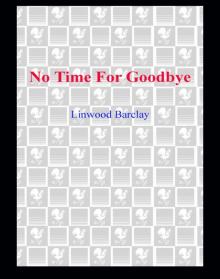 No Time for Goodbye
No Time for Goodbye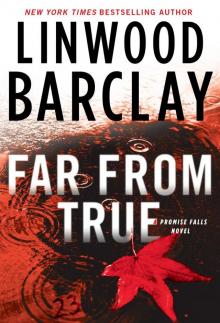 Far From True
Far From True Lone Wolf
Lone Wolf Fear the Worst
Fear the Worst Broken Promise
Broken Promise A Tap on the Window
A Tap on the Window Parting Shot
Parting Shot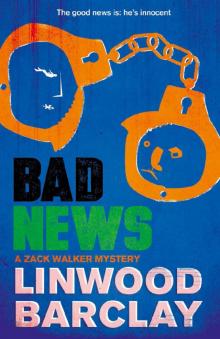 Bad News
Bad News Too Close to Home
Too Close to Home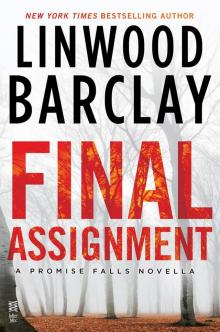 Final Assignment
Final Assignment No Safe House
No Safe House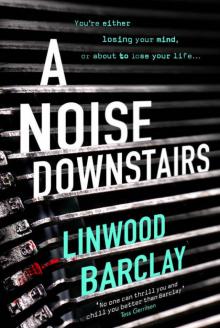 A Noise Downstairs
A Noise Downstairs Bad Guys
Bad Guys The Accident
The Accident Stone Rain
Stone Rain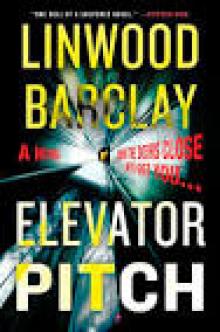 Elevator Pitch
Elevator Pitch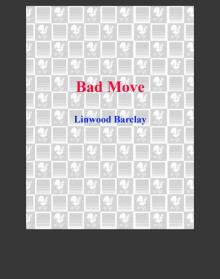 Bad Move
Bad Move Clouded Vision
Clouded Vision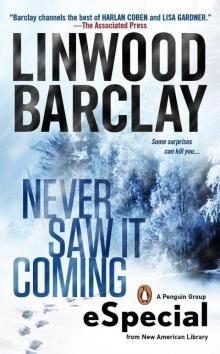 Never Saw It Coming
Never Saw It Coming The Twenty-Three
The Twenty-Three Find You First
Find You First Never Look Away
Never Look Away Elevator Pitch (UK)
Elevator Pitch (UK)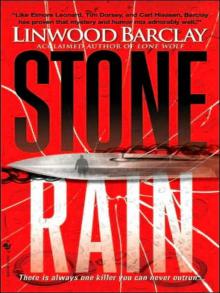 Stone Rain zw-4
Stone Rain zw-4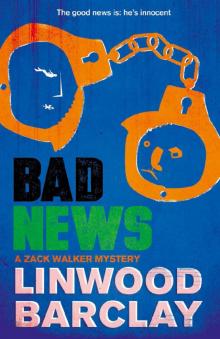 Bad News: A Zack Walker Mystery #4
Bad News: A Zack Walker Mystery #4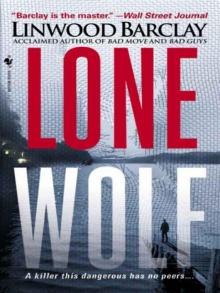 Lone Wolf zw-3
Lone Wolf zw-3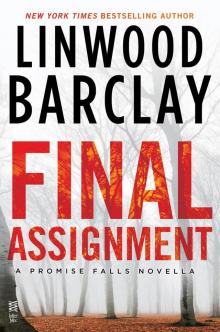 Final Assignment: A Promise Falls Novella
Final Assignment: A Promise Falls Novella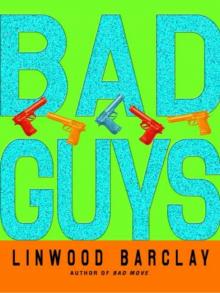 Bad Guys zw-2
Bad Guys zw-2 Never Saw It Coming: (An eSpecial from New American Library)
Never Saw It Coming: (An eSpecial from New American Library) Never Look Away: A Thriller
Never Look Away: A Thriller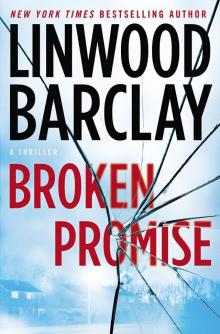 Broken Promise: A Thriller
Broken Promise: A Thriller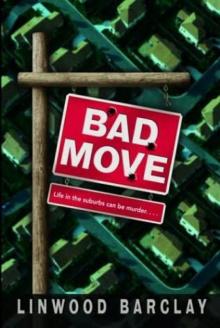 Bad Move zw-1
Bad Move zw-1 The Twenty-Three 3 (Promise Falls)
The Twenty-Three 3 (Promise Falls)